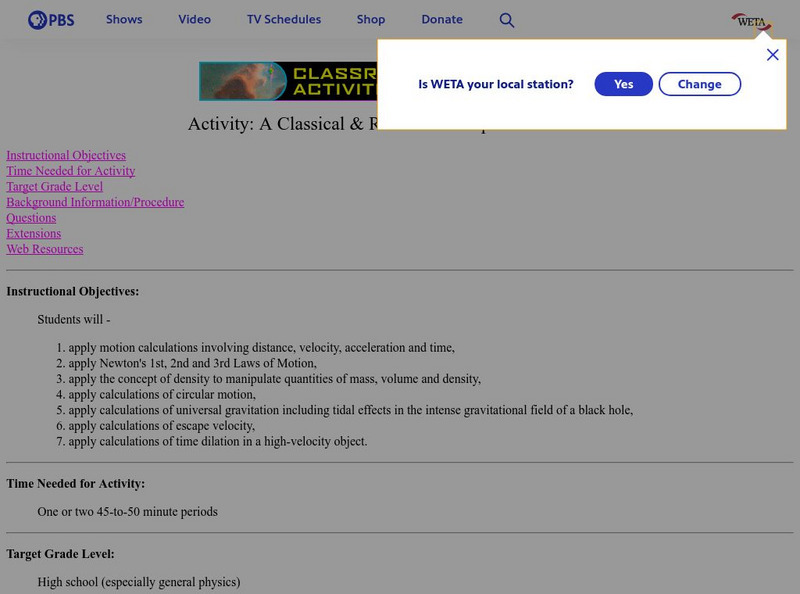Hi, what do you want to do?
Curated OER
Cranes, Crosswalks, and Big Gulps
Pupils watch a video and answer questions based on wildlife jobs. In this wildlife lesson plan, students learn that biologists don't just play with animals but that there is a lot of study involved.
Curated OER
Chromatography
Students research types of chromatography and complete chromatography experiments.
Curated OER
Geology Quiz- Common Rocks
In this earth science quiz worksheet, learners attempt to guess the name of the rocks based on the descriptions that are given on the page. They determine the names of 10 rocks that are igneous or sedimentary, and check their work with...
Curated OER
Measurement
Students experience a positive science experiment and study fundamental concepts of measurement.
Curated OER
Exploring the Night Sky: Fall/Winter
Students explain how moon phases occur. They explain three ways that the night sky has been used through history. Students locate some of the constellations in the night sky. They discuss stories and myths surrounding stars.
Curated OER
Kwanzaa Memory Book
Students create a Kwanzaa memory book. In this memory book lesson, students cut a cover from a brown paper bag and use ziplock bags as pages. In the ziplock bags they put construction paper with photos and drawings.
Curated OER
Create a Tornado
Young scholars study weather patterns and conditions by making their own tornado. In this tornado lesson, students create a tornado in a bottle to study weather conditions.
Curated OER
Making a Solar Eclipse Book: The Sun and Moon During a Solar Eclipse
Students make book covers displaying the Sun during a solar eclipse and a labeled illustration of the Sun.
Curated OER
In Character
Young scholars fill out a character trait graphic organizer about characters in a book that they are reading. In this characters lesson plan, students see how traits relate to character actions.
Curated OER
Try This On For Size!
Students view a video to gather information about our solar system. They create models of the planets to scale and place them in scale relative to their distances from the sun. They also visit a planetarium or use the internet to gather...
Curated OER
Counting by Tens
First graders listen to "One Is a Snail, Ten Is a Crab", a story about a crab with ten feet and counting by tens. They create their own crab to practice counting by tens to one hundred.
Curated OER
Water Quality Monitoring
Students comprehend the four parameters of water quality. They perform tests for salinity, dissolved oxygen, pH and clarity or turbidity. Students comprehend why scientists and environmental managers monitor water uality and aquatic...
Curated OER
Science: Spider Models
First graders create spider models to discover its anatomy. They use construction paper and sequins to make their spiders and use pictures as examples for their models. As an alternative, 1st graders make posters of the spider's parts....
Curated OER
Constructing a Spectroscope
Students construct a simple spectroscope. They observe the emission spectrum produce by a source of light.
Curated OER
Create a Tornado
In creating a tornado, young scholars create a model tornado in a two-liter soda bottle. In order to accomplish this feat, students label each of their bottles with a marker, then tape the mouths of the bottle together and fill with...
Curated OER
Color
Students locate something in the classroom that is the same color that is written on the card they were given and go stand by it. They share what they found and place their card on a color posted next to the correct color. Finally,...
Curated OER
Introduction to Worm Bin Project
Young scholars observe the decomposing process of the food chain in a worm bin. They observe whether the type of food fed to worms affect the castings given off during the decomposition process. They learn and practice graphing their...
Curated OER
Screening River Rocks
First graders explore river rocks. Searching with screens and containers, 1st graders identify the different kinds and sizes of rocks. They separate rocks into containers according to pebbles, gravel and sand. Students write about their...
Curated OER
Analytical Spectroscope
Students using a spectroscope view different substances when heated with electricity.
Curated OER
What's the opposite of school?
Third graders create a poem in which they compare and contrast opposites.
Curated OER
The Appearance of the Moon
Third graders watch a demonstration on how craters were formed on the moon. Individually, they care given a set of materials that represent the moon surface and make their own craters. To end the lesson, they measure the size of the...
NASA
Nasa: Star Child: Black Holes [Pdf]
This NASA teacher's guide provides educators with background information and classroom activities about black holes. Requires Adobe Reader. [PDF]
Wikimedia
Wikipedia: The Black Hole
This site examines the black hole as an object in astrophysics. Delve into this comprehensive resource that covers this concept from its history, to qualitative physics, the reality of black holes, mathematical physics and more.
PBS
Pbs: A Classical and Relativistic Trip to a Black Hole
This PBS site is a classroom activity that takes a trip to a black hole. Students apply calculations on distance, velocity, acceleration, time, circular motion, density, and more.


























![Nasa: Star Child: Black Holes [Pdf] Unit Plan Nasa: Star Child: Black Holes [Pdf] Unit Plan](https://static.lp.lexp.cloud/images/attachment_defaults/resource/large/FPO-knovation.png)

